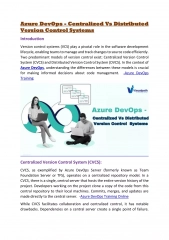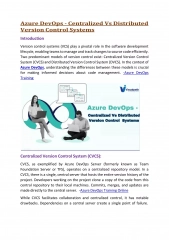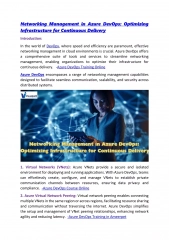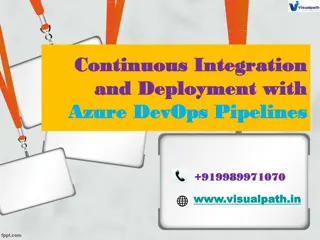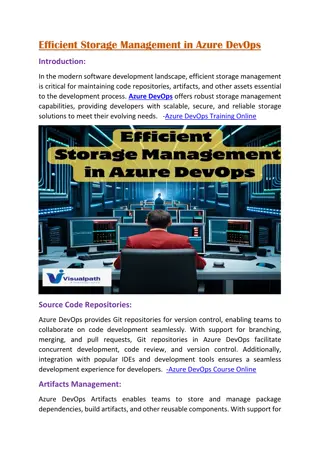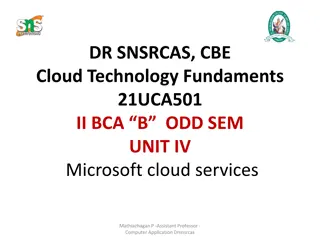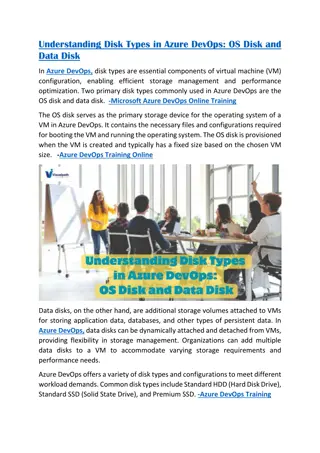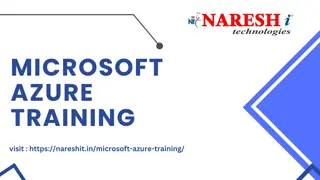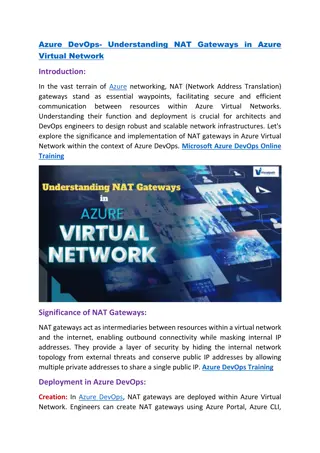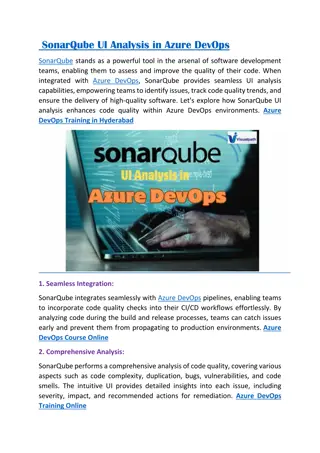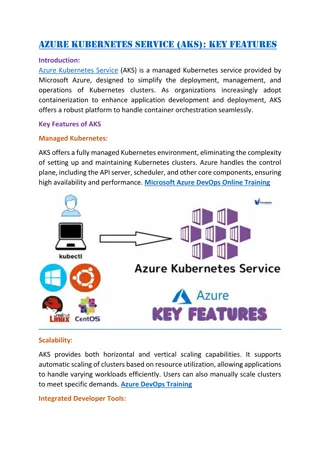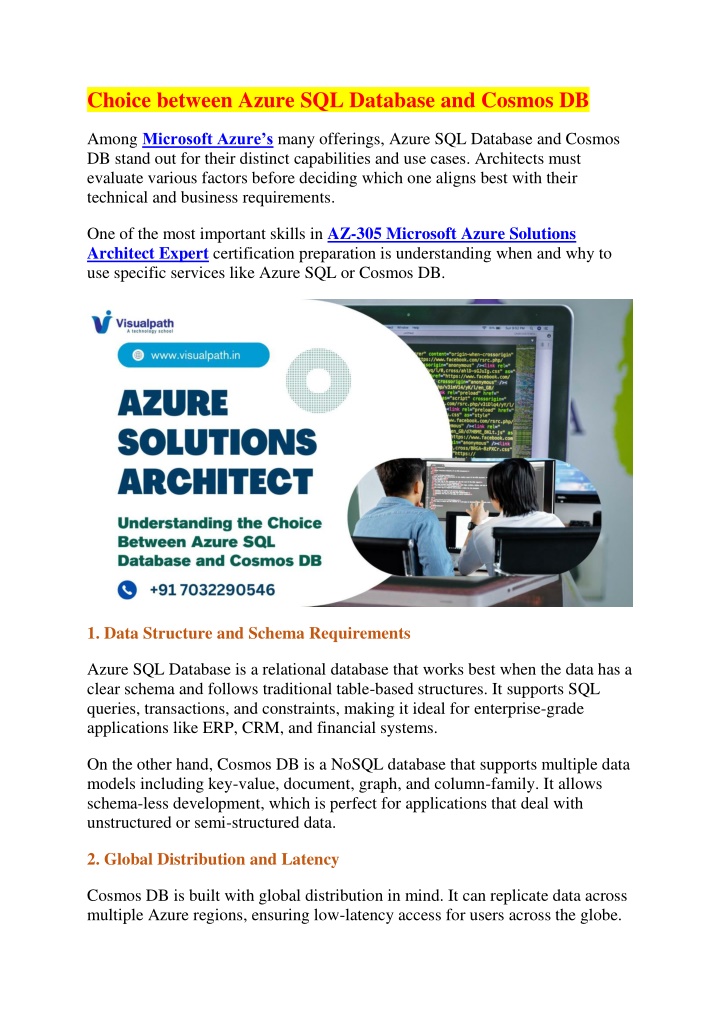
Best AZ-305 Online | Microsoft Azure Training in Hyderabad
Advance your cloud career with VisualPathu2019s Microsoft Azure Training in Hyderabad. Enroll in our AZ-305 Online Training for hands-on experience, real-time projects, expert guidance, and lifetime access to session recordings. Perfect for IT profe
Download Presentation

Please find below an Image/Link to download the presentation.
The content on the website is provided AS IS for your information and personal use only. It may not be sold, licensed, or shared on other websites without obtaining consent from the author. If you encounter any issues during the download, it is possible that the publisher has removed the file from their server.
You are allowed to download the files provided on this website for personal or commercial use, subject to the condition that they are used lawfully. All files are the property of their respective owners.
The content on the website is provided AS IS for your information and personal use only. It may not be sold, licensed, or shared on other websites without obtaining consent from the author.
E N D
Presentation Transcript
Choice between Azure SQL Database and Cosmos DB Among Microsoft Azure s many offerings, Azure SQL Database and Cosmos DB stand out for their distinct capabilities and use cases. Architects must evaluate various factors before deciding which one aligns best with their technical and business requirements. One of the most important skills in AZ-305 Microsoft Azure Solutions Architect Expert certification preparation is understanding when and why to use specific services like Azure SQL or Cosmos DB. 1. Data Structure and Schema Requirements Azure SQL Database is a relational database that works best when the data has a clear schema and follows traditional table-based structures. It supports SQL queries, transactions, and constraints, making it ideal for enterprise-grade applications like ERP, CRM, and financial systems. On the other hand, Cosmos DB is a NoSQL database that supports multiple data models including key-value, document, graph, and column-family. It allows schema-less development, which is perfect for applications that deal with unstructured or semi-structured data. 2. Global Distribution and Latency Cosmos DB is built with global distribution in mind. It can replicate data across multiple Azure regions, ensuring low-latency access for users across the globe.
It supports multi-region writes and provides a 99.999% availability SLA for read and write operations. Azure SQL does offer geo-replication, but it's limited to read-only replicas and requires manual management of failover scenarios. If your application demands active-active global writes with low latency, Cosmos DB is the better fit. 3. Scalability and Performance Both services offer scalability, but in different ways. Cosmos DB is designed for horizontal scaling, allowing you to scale throughput and storage independently across multiple regions. Azure SQL scales vertically and has features like elastic pools to manage performance across multiple databases. However, vertical scaling may become a limitation for extremely large datasets or high-throughput scenarios. These performance considerations are a core focus of Azure Solution Architect Training Online, as architects must design systems that are responsive and resilient. 4. Consistency and Availability Models Cosmos DB offers five consistency models strong, bounded staleness, session, consistent prefix, and eventual providing developers with flexibility to balance consistency and performance. Azure SQL offers strong consistency within a single region, but doesn t provide the same fine-grained consistency controls as Cosmos DB. This makes Cosmos DB more suitable for applications that require global consistency tuning. 5. Cost Considerations Azure SQL uses a pricing model based on DTUs or vCores, depending on the performance tier. Cosmos DB pricing is based on provisioned throughput (RU/s) and storage, which can become expensive if not carefully managed. However, it s more suitable for dynamic workloads that require high throughput and global distribution. 6. Integration and Ecosystem Support Azure SQL integrates well with tools like Power BI, Azure Data Factory, and traditional SQL Server Management Studio (SSMS). It supports T-SQL,
making it an easier transition for developers from a traditional database background. Cosmos DB integrates seamlessly with modern app development stacks like Azure Functions, Azure App Service, and offers SDKs for multiple languages. For professionals involved in Azure Solutions Architect Expert Training, knowing these integration points is crucial for designing cohesive solutions. 7. Use Case Scenarios Use Azure SQL Database for OLTP systems, financial applications, or enterprise business software. Use Cosmos DB for IoT telemetry, personalized e-commerce, gaming leaderboards, and real-time analytics requiring high throughput and availability. Conclusion: Aligning Database Choice with Architecture Goals Choosing between Azure SQL Database and Cosmos DB is not a one-size- fits-all decision. It depends on data structure, scalability needs, consistency requirements, global availability, and integration preferences. By understanding the specific features and limitations of each, you can design architectures that are scalable, cost-effective, and high-performing. Trending courses: Artificial Intelligence, Azure Data Engineering, SAP AI Visualpath stands out as the best online software training institute in Hyderabad. For More Information abouttheAzure Solution Architect Training Online Contact Call/WhatsApp: +91-7032290546 Visit: https://www.visualpath.in/az-305-microsoft-azure-solutions-architect- training.html




